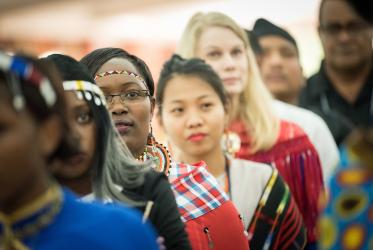In Italy, from 20-25 May, the WCC Pilgrim Team saw rich examples of the diaconal work promoted by WCC member churches in assisting refugees and migrants. Among the objectives of the visit, there was the will to express solidarity and accompaniment with refugees and migrants arriving in Italy and to solidify ecumenical bonds among WCC member churches in the country, the Federation of Protestant Churches in Italy, and related organizations and networks in their efforts to operate humanitarian and social projects that welcome and help refugees integrate into society.
The WCC delegation was led by Dr Agnes Abuom, moderator of the WCC central committee, and Torsten Moritz, general secretary of the Churches’ Commission for Migrants in Europe. “The WCC should revisit the program of the welcoming churches in providing hospitality, fellowship and sanctuary for migrants. The effects of migration in its varied forms intersects with all programmatic areas of the WCC,” Abuom said.
The Pilgrim Team Visit to Armenia, taking place from 26 May through 2 June, is expressing solidarity and accompaniment with sisters and brothers in Armenia through interaction with grassroots groups and religious leaders, focusing on issues of trauma healing, defending of religious and cultural monuments, and diaconal work of member churches in Armenia.
In a greeting to H.H. Supreme Patriarch and Catholicos of All Armenians Karekin II, WCC acting general secretary Rev. Prof. Dr Ioan Sauca expressed heartfelt gratitude for the receiving of the Pilgrim Team Visit.
“Seeing the comfort and transformation that the church is providing will be a valuable part of the experience,” Sauca wrote. “We give thanks for your life and ministry and renew the expression of our deep gratitude.”
In Norway, a visit with Indigenous Sámi communities is taking place 31 May through 2 June. In the Arctic region, which is heating up twice as fast as the global average, Indigenous peoples are bearing the brunt of climate change impacts. Sámi people in Norway and other parts of Northern Europe face increasing threats to their ways of living as well as social and cultural dislocation.






